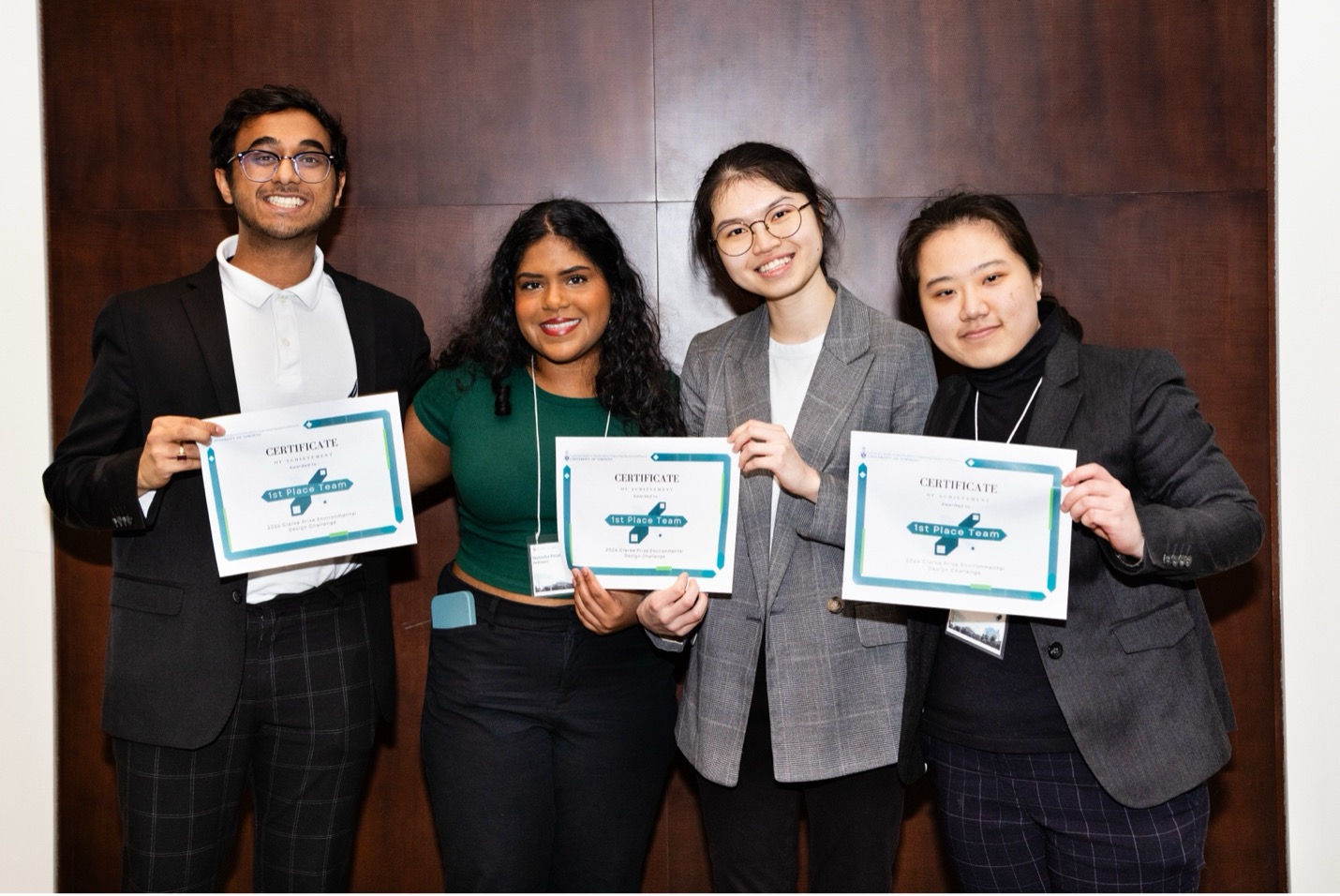At the end of January, U of T Engineering undergraduate students with a passion for sustainability came together for a two-day hackathon. Hosted by the Institute for Studies in Transdisciplinary Engineering Education and Practice (ISTEP), the 2024 Clarke Prize Environmental Design Challenge asks students to generate innovative solutions to further advance the university’s sustainability goals.
“The Clarke Design competition has shed a light on the integrated nature of sustainability and engineering, and how I can be a better engineer,” said one participant.
The student teams pitched their innovations to a panel of industry and academic judges to compete for a $10,000 grand prize, with additional $7,000 and $5,000 prizes for second and third place, respectively. The Clarke Prize is named in honour of the late Richard Clarke (ChemE 5T4), whose philanthropy made the event possible. Clarke believed that today’s engineer must be critically engaged with the broader societal and environmental impact of their practice.
U of T was named the most sustainable university in the world by the QS World Rankings: Sustainability 2024, and the Clarke Prize encourages students to embody this spirit and apply their technical expertise towards creating positive sustainable outcomes that will last generations.The hackathon opened with a speech from keynote speaker Sandra Odendahl (ChemE MASc 9T0), Senior Vice President and Head, Sustainability and Diversity at the Bank for Canadian Entrepreneurs, who echoed the call for critically engaged engineers willing to take the initiative in actualizing sustainability solutions.
A defining characteristic of this hackathon was the inclusion of embedded workshops centred around key communication skills, teamwork efficacy, systems mapping and the circular economy. For example, students worked through scenarios in which teams are placed under pressure, learning how to effectively manage these situations to reach a positive resolution.
On day two, teams had five minutes to convince the judges of the effectiveness, feasibility and practicality of their designs, which was followed by a five-minute Q&A. Ultimately, over 40 teams were narrowed down to three finalists.
The third-place team — Mako Darra (Year 3 ChemE), Amy Baggs (Year 3 ChemE), Talia Yawney (Year 3 ChemE), Kashish Mistry (Year 3 ECE) and Wei Fung Low (Year 4 MIE)— proposed a reimagined use of the Galbraith Building quad as an Indigenous learning space.
Darra explained their project as a way “to reconnect engineering students with nature through land-based learning and environmental action-planning.”
The second-place team — Steven Zhang (Year 3 ECE), Ben Smieja (Year 4 ECE), Karishma Shah (Year 4 ECE), and Leina Xu (Year 3 EngSci) — came up with ClarkeCoins, “a rewards platform promoting sustainable actions on the U of T campus,” explained Smieja.
By incentivizing actions such as using reusable containers when purchasing from a U of T vendor, students could make a positive impact while also receiving rewards in the form of discounts on food, books and U of T merchandise.
Finally, the 2024 Clarke Prize winning team — Darsh Jain (Year 4 ChemE), Blythe Huang (Year 3 ChemE), Ally Cheung (Year 4 EngSci), and Natasha Pereira (Year 4 ChemE) — presented their idea for extending the lifecycle of cooking oil used on campus. Their projections estimated a 1,725-ton reduction in CO2 emissions on campus in the first five years alone.
“Our solution is based on the circular economy, focusing on the production of biodiesel using the cooking oil in dining halls, food vendors and food trucks,” Jain added.
Students left feeling energized about the future of sustainability in engineering and provided glowing feedback about their experience.
“[It was] an incredible weekend brimming with creativity, problem solving and renewed hope for the future of the environment,” said one student participant.




